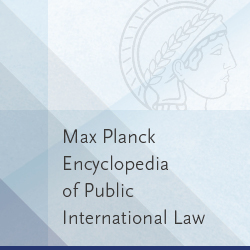 The July 2015 update to the Max Planck Encyclopedia of Public International Law (MPEIL) is now live, bringing 18 new articles and 9 updated articles to the collection.
The July 2015 update to the Max Planck Encyclopedia of Public International Law (MPEIL) is now live, bringing 18 new articles and 9 updated articles to the collection.
A range of different topics are covered including; war crimes, non-performance of treaty obligations, bioethics and much more. A full listing of the update content is available here
MPEIL is part of the online Oxford Public International Law collection. You can search it alongside Oxford Reports on International Law and Oxford Scholarly Authorities on International Law.
For full text access, you will need to be logged in as a University of Exeter user. Select University of Exeter when prompted, or login via the Library Catalogue or the Electronic Library.
Learn more about OPIL from the online video

 The
The  The University has access to the World Treaty Library via Hein Online. You can access it via the
The University has access to the World Treaty Library via Hein Online. You can access it via the